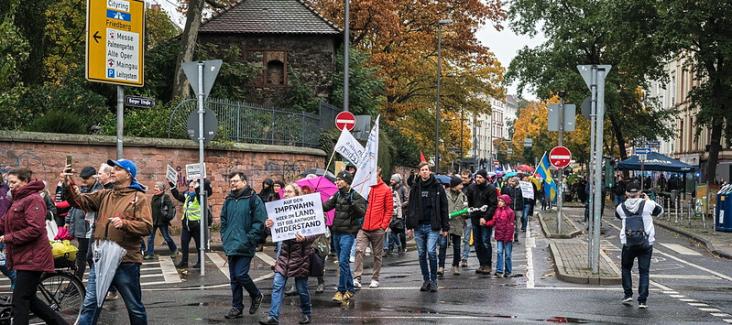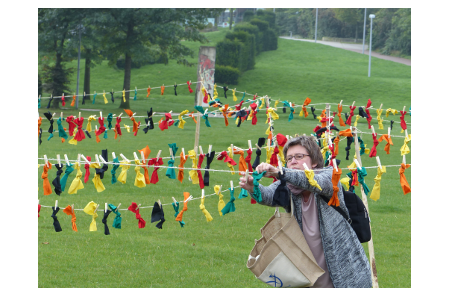EXCEPTIUS started shortly after the COVID pandemic began to take over the world, in September 2020. At that time, Clara Egger had two colleagues in France, who started collecting data on the Covid-19 measures. “And then”, Egger says, one of them “brought me in with this idea of creating an international team of people. I brought in a lot of colleagues and partners from Poland, Malta, Spain, et cetera. What is going on in those countries in terms of exceptional measures?”. Clara Egger then applied for funding from the Dutch research agency for health research and development – and got the funding. “This is how we somehow scaled up this original idea” she says.
In the meanwhile, the team consists of researchers in 15 different countries in Europe. They are all united by an interest in how differently individual countries have reacted and continue to react to the pandemic, moreover, how democracies cope with a crisis such as COVID-19. The team not only collects data at the national level, but also collects and evaluates data from sub-national levels.
“We want to understand how governments during COVID-19 departed from democratic governance.”
According to Egger, the main objective of EXCEPTIUS is to find out what makes countries crisis-resistant in terms of democratic governance and human rights. Because every time there is a major crisis, there is a danger that the crisis will be used by governments and their extraordinary powers to dismantle democracy.
So far, the team around Clara Egger has been able to show off that the severity of the pandemic itself does not explain what governments are doing: “What explains what governments are doing is actually the level of trust they have. So when governments are trusted by the people, they do measures that are much more proportionate than when there is no trust. So, there is a political rational element.” Harsh measures, according to Egger, also increase the level of mistrust towards a government. And the higher this level is, the stronger the measures become because governments fear for compliance with these rules. This vicious circle can be observed in France for example, people have increasingly taken to the streets in recent months to protest against the measures taken to contain the pandemic.
Furthermore, the team is currently researching, with a focus on France, Belgium, and the Netherlands, why in some cases the state leadership tried to compensate for a loss of freedom by granting people new rights: “What we felt is that the more democratised a country is before the crisis, the better it preserves democracy. So that's both good and bad news. The good news is that before the crisis we can plan for such a crisis. So basically, if we want to be better able to preserve democracy in times of crisis, then we have to implement democratic reform right now.”
In Hungary or Poland, democracy was already endangered, the risk of the decline of democracy is much higher there than it is in other countries. But according to Egger, there are also positive examples: in Switzerland and also in the Netherlands, the measures are very transparent, the population is less resistant to the government. In the Netherlands, for example, the measures were relaxed when the situation was more relaxed and strengthened again when the hospitalisation rate shot up again.
“Journalists and politicians should be very careful when comparing countries.”
Even though the Netherlands now has stricter regulations than it did a few weeks ago, it is very difficult to compare countries and their catalogues of measures, Egger says. Countries often use the same vocabulary - lockdown, green pass or curfew - to describe different measures. The lockdown in particular is a measure taken by governments, which means very different restrictions across Europe, but also globally. A lock down in the Netherlands is much less constraining than a lockdown in France, Poland or Hungary. EXCEPTIUS wants to capture and describe these differences. In addition to these different meanings for individual measures and the different levels of confidence in the respective countries, different past experiences with managing a pandemic also play a role in the situation in each country.
“These webinars helped to reflect on some specific cases.”
In addition to collecting and analysing data, EXCEPTIUS also focuses on knowledge transfer. EXCEPTIUS organised and hosted a series of webinars on YouTube that are accessible to everyone and deal with current burning issues of democracy, such as the right to demonstrate and voting and holding elections in times of pandemics. But the webinars didn't just help the team share their findings with people and make them accessible to those who don't read scientific publications or studies. They also allowed the team to get a good look at very specific situations outside of Europe, namely in Africa and Asia.
In the near future, EXCEPTIUS would also like to launch a podcast discussing how to maintain democratic resilience in times of crisis.
Asked about the most surprising results from her work at EXCEPTIUS, Clara Egger states that it is the fact that neither the health resources nor the severity of the pandemic are shaping what governments are doing, which seems to be quite unusual: “There is much more than that in, to explain why governments are acting the way they do. They tend to overreact to the crisis in some cases.” One of the most exciting questions in the future remains, of course, how to fight the virus most effectively while also preserving democracy. The world is focused on public health and the sanitary crisis at the moment. However, the challenges for democracies resulting from the pandemic should not be ignored.
Democracy International supports the project as a civil society partner. If you want more information and news about EXCEPTIUS, you can find it here. The team's data sets are also available on the project's website.
Article photo courtesy of 7c0 (CC BY 2.0)


